Reading: Unit 4 Lecture Transcripts & Illustrations
UNIT 4 LECTURE 1
Those who found themselves in the difficult position of having to explain to the romans what the Christian faith was, found that they were faced with a hostile audience. The romans, from the start, looked upon the Christians as following a vile superstition. They were accused of various crimes such as incest and cannibalism. These charges were difficult to deny since the basis for them was found in the worship that went on in the early churches.
We saw earlier that the worship in the early church was based on the formula that was handed down to them by the Jewish synagogue. In what I am going to share with you now, we have the words of a man named Justin whom church history has come to know as Justin Martyr. He was accused of the crime of being a follower of Jesus, a man crucified by a Roman governor in Judea and who was now claimed to be alive. Christians worshipped this convict as God. Justin, in a letter handed down to us over the centuries, attempts to get his Roman judge to understand what goes on in the worship of the churches.
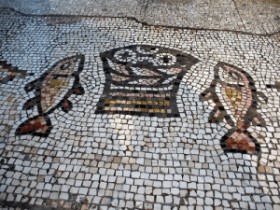
Chapter LXV.--Administration of the sacraments.
But we, after we have thus washed him who has been convinced and has assented to our teaching, bring him to the place where those who are called brethren are assembled, in order that we may offer hearty prayers in common for ourselves and for the baptized [illuminated] person, and for all others in every place, that we may be counted worthy, now that we have learned the truth, by our works also to be found good citizens and keepers of the commandments, so that we may be saved with an everlasting salvation. Having ended the prayers, we salute one another with a kiss.1908There is then brought to the president of the brethren1909bread and a cup of wine mixed with water; and he taking them, gives praise and glory to the Father of the universe, through the name of the Son and of the Holy Ghost, and offers thanks at considerable length for our being counted worthy to receive these things at His hands. And when he has concluded the prayers and thanksgivings, all the people present express their assent by saying Amen. This word Amen answers in the Hebrew language toγένοιτο[so be it]. And when the president has given thanks, and all the people have expressed their assent, those who are called by us deacons give to each of those present to partake of the bread and wine mixed with water over which the thanksgiving was pronounced, and to those who are absent they carry away a portion.
Chapter LXVI.--Of the Eucharist.
And this food is called among usΕὐχαριστία1910[the Eucharist], of which no one is
allowed to partake but the man who believes that the things which we teach are
true, and who has been washed with the washing that is for the remission of sins,
and unto regeneration, and who is so living as Christ has enjoined.For not as common bread and common
drink do we receive these; but in like manner as Jesus Christ our Saviour,
having been made flesh by the Word of God, had both flesh and blood for our
salvation, so likewise have we been taught that the food which is blessed by
the prayer of His word, and from which our blood and flesh by transmutation are
nourished, is the flesh and blood of that Jesus who was made flesh.1911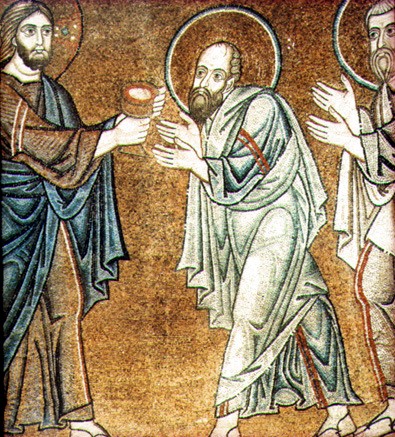 For the apostles, in the memoirs composed
by them, which are called Gospels, have thus delivered unto us what was
enjoined upon them; that Jesus took bread, and when He had given thanks, said,
"This do ye in remembrance of Me,1912this is My body;” and that, after the same
manner, having taken the cup and given thanks, He said, "This is My blood;” and
gave it to them alone. .....
For the apostles, in the memoirs composed
by them, which are called Gospels, have thus delivered unto us what was
enjoined upon them; that Jesus took bread, and when He had given thanks, said,
"This do ye in remembrance of Me,1912this is My body;” and that, after the same
manner, having taken the cup and given thanks, He said, "This is My blood;” and
gave it to them alone. .....
Chapter LXVII.--Weekly worship of the Christians.
And we afterwards continually remind each other of these things. And the wealthy among us help the needy; and we always keep together; and for all things wherewith we are supplied, we bless the Maker of all through His Son186Jesus Christ, and through the Holy Ghost.And on the day called Sunday,1913all who live in cities or in the country gather together to one place, and the memoirs of the apostles or the writings of the prophets are read, as long as time permits; then, when the reader has ceased, the president verbally instructs, and exhorts to the imitation of these good things.Then we all rise together and pray, and, as we before said, when our prayer is ended, bread and wine and water are brought, and the president in like manner offers prayers and thanksgivings, according to his ability,1914and the people assent, saying Amen; and there is a distribution to each, and a participation of that over which thanks have been given,1915and to those who are absent a portion is sent by the deacons. And they who are well to do, and willing, give what each thinks fit; and what is collected is deposited with the president, who succours the orphans and widows and those who, through sickness or any other cause, are in want, and those who are in bonds and the strangers sojourning among us, and in a word takes care of all who are in need. But Sunday is the day on which we all hold our common assembly, because it is the first day on which God, having wrought a change in the darkness and matter, made the world; and Jesus Christ our Saviour on the same day rose from the dead. For He was crucified on the day before that of Saturn (Saturday); and on the day after that of Saturn, which is the day of the Sun, having appeared to His apostles and disciples, He taught them these things, which we have submitted to you also for your consideration
Chapter LXVIII.--Conclusion.
And if these things seem to you to be reasonable and true, honour them; but if they seem nonsensical, despise them as nonsense, and do not decree death against those who have done no wrong, as you would against enemies. For we forewarn you, that you shall not escape the coming judgment of God, if you continue in your injustice; and we ourselves will invite you to do that which is pleasing to God. And though from the letter of the greatest and most illustrious Emperor Adrian, your father, we could demand that you order judgment to be given as we have desired, yet we have made this appeal and explanation, not on the ground of Adrian's decision, but because we know that what we ask is just.
That is Ignatius writing to the emperor to defend the faith. It was about in the year 110 that he was writing.
UNIT 4 LECTURE 2
The Apostolic fathers is a term used to describe the writings which have come down to us from the late first century and into the second. These are people who are thought to have been mentored by the Apostles of Jesus. They have left us some writings which help us to get a look at the sort of things that concerned the church at the turn of the first century and in the decades that began the second century after Jesus.
The apostolic fathers were the first leaders who helped the church to make the transition from a world where people had personally known Jesus to one where the writings of the apostles were the source of our knowledge of Jesus. So they form a very important link in the history of the church. They are people who knew Jesus because another had told them of him. They were leaders because many churches looked up to them as being personally aware of what Jesus wanted in their life together because they had known at least one of the apostles.
So the apostolic fathers are important to our study of church history in that
they help us to see how the scriptures were used to have a standard on which to
stand. The holy writings were the source of insights and wisdom in how to make
the most of walking by faith each day.
The basic list of the apostolic fathers varies. But this is a commonly accepted group of writings and persons
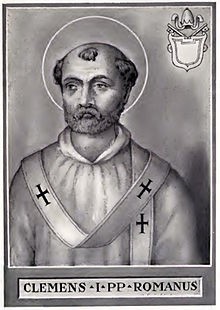 1)Clement
of Rome, the third successor toPeteras Bishop of Rome, "had seen the
blessed Apostles (Peter and Paul) and had been conversant with them"
(Irenaeus,Adversus Haereses, III, iii, 3).
1)Clement
of Rome, the third successor toPeteras Bishop of Rome, "had seen the
blessed Apostles (Peter and Paul) and had been conversant with them"
(Irenaeus,Adversus Haereses, III, iii, 3).
a.From Clement we have what are known as his letters. First clement is a letter that he prepared and sent to the church in Corinth. In it, Clement calls the church to repent of becoming divided. What seems to have happened is that a group of young men had revolted against the leadership of the elders in the church and had decided to go their own way. Clement calls them to return to the structure that God had given them. He calls for respecting those in authority over us. One of his main points is in the way he uses the orderliness of the created world to call his readers to account for their disorderly conduct.
b.Second clement is not thought to actually be from the hand of the same person as first clement. What the letter seems to be is a transcript of a sermon delivered sometime around the year 100 in a worship service somewhere which was copied over and distributed in the name of Clement. It has some references to a previous period in the lives of those addressed when their minds were crippled and they worshipped wood, and stone.
2)Ignatius of Antiochwas the second successor of Peter in the See of Antioch (Eusebius, Hist. Eccl., III, 36) and during his life in the center of Christian activity he may have met with others of the Apostolic band. An accepted tradition, substantiated by the similarity of Ignatius's thought with the ideas of the Johannine writings, declares that he was a disciple of theApostle John.
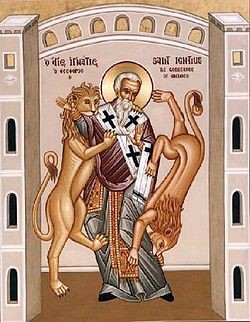 A.Ignatius
was the bishop of Antioch - the city mentioned in the book of Acts where the
followers of Jesus were first called Christians. While he led the church there,
a persecution arose and he was arrested for believing in the superstition which
was repugnant to the romans. After his arrest, it was decided that such a
valued leader of the Christians should be taken to Rome to be killed as an
example to all of those who might think they could join the hated group.
A.Ignatius
was the bishop of Antioch - the city mentioned in the book of Acts where the
followers of Jesus were first called Christians. While he led the church there,
a persecution arose and he was arrested for believing in the superstition which
was repugnant to the romans. After his arrest, it was decided that such a
valued leader of the Christians should be taken to Rome to be killed as an
example to all of those who might think they could join the hated group.
B.On his way he was chained to what he called ten leopards, a group of ten soldiers who, when treated with kindness became worse in their treatment of him. It was while they were on their way to Rome, that Ignatius, at a city where they stopped along the way, wrote seven letters which we have yet today. One of the letters was addressed to the Church of Rome. In it he asks them to not plead his case to the emperor. He is going to die for Christ and that will be his entry into life everlasting.
3. Polycarp was "instructed by Apostles"
(Irenaeus, op. cit., III, iii, 4) and had been a disciple ofJohn(Eusebius,
op. cit., III, 36; V, 20) whose contemporary he was for nearly twenty years. He
later trained Irenaeusas a disciple, thus giving Irenaeus'
teachings great reliability and authority. We are going to hear about the martyrdom
of Polycarp more next week.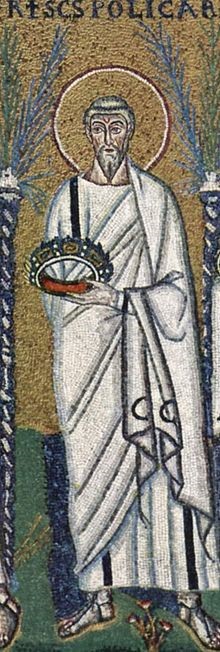
3)TheDidache, also known asThe Teaching of the Lord to the Gentiles by the Twelve Apostles, orThe Teaching of the (Twelve) Apostlesis basically a handbook or manual of Christian ethical instruction and church order (Holmes,Dictionary of the Later New Testament & Its Developments, p. 301).
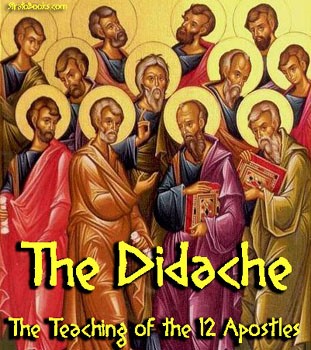
We have looked at the teaching of the Didache previously. I mention it here again since it is considered an important part of the legacy left to us by the apostolic fathers.
4)The Epistle of Barnabas is an early second century document concerned with showing that Christians are the true heirs of God's covenant. Its author remains anonymous.
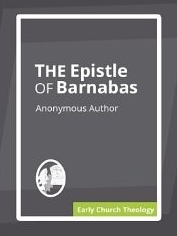
The epistle of Barnabas is named for the man who took Paul under his wing and mentored him when Paul had first had his vision of Jesus. It is either a general treatise or was intended for some community in which Alexandrian ideas prevailed, though it is not possible to define either its destination, or the locality from which it was written, with any greater accuracy. Its main object is to warn Christians against a Judaistic conception of the Old Testament, and the writer carries a symbolic exegesis as far as did Philo; indeed he goes farther and apparently denies any literal significance at all to the commands of the Law. The literal exegesis of the ceremonial law is to him a device of an evil angel who deceived the Jews.
5)The Shepherd of Hermas was a popular document in the second and third centuries. It's significance rests in that it sheds light on the Christian situation at Rome in the mid-second century. The author(s) is unknown.
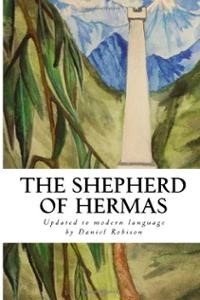
Each revelation is accompanied by an explanation, and from these it can be seen that though the form of the book is apocalyptic and visionary, its object is practical and ethical. The main problem, which constantly recurs, is that of sin after baptism. In the circle to which Hermas belonged the belief obtained that Christians after baptism were capable of leading sinless lives, and that if they fell they could not again obtain forgiveness. Experience, however, had shown that in this case few indeed would be saved, and the message of Hermas was that for sin after baptism there was still the possibility of forgiveness for those who repented, though this repentance would not avail more than once. A great part of the book is taken up in developing the details of this doctrine of repentance, which is entrusted to an angel called the Shepherd, who gives his name to the book, and it is obvious that we have here the beginning of the Catholic doctrine of penance.
The Shepherd is divided into Visions (in the last of which the Shepherd appears), Commandments or Mandates, as they are more usually called, and Parables or Similitudes. It may roughly be said that in the Visions the necessity for repentance is enforced, in the Mandates the life required for the penitent is explained, and in the Similitudes the working and theological doctrine of repentance is developed.
UNIT 4 LECTURE THREE
Today, I want to take a few minutes to review with you some of the teachings of the Apostolic Fathers. In their lives, they were confronted with a challenging situation. From the outside, they were attacked as following a terrible superstition which was worthy of being brutally stamped out. And from the inside, they were confronted by teachers who wanted to show that they were able to develop a better idea of who Jesus was than those who had walked with him.
It is the second group that I need to describe for a bit.
In our own day, we do well to be aware of the teachings of what we call heretics in the early church. Had these teachings gained the upper hand in the Church, one would be hard pressed to estimate where the church would be at a today. They were of two types: The Gnostic and the Ebionite.
In the Gnostic circles, we have the teaching of a man named Basilides. He was convinced of more than one problem in the doctrine of Paul and Peter.
His contention was that Jesus could not have been both God and man. That simply was not an option as far as he was concerned. His opposition arose from his philosophical judgment that God was so far removed from the physical realm that to think that God had become a human person was blasphemy. Since Jesus was only human, his death could not atone for all of humanity - it was finite. And secondly, he insisted that Jesus could not suffer as a substitute for others. If he suffered death, it could only be for his own sin. If he was sinless, then his death was a great mistake. He could not, as human being, save anyone but himself. He said that there could not be any situation in which one could honestly think in terms of a person dying for another. I think you see where this would have taken the church - to a point where there was no good news left to hear. It had all become bad news. For if Christ did not suffer for humanity, but only for himself, then we are still in our sin.
Another Gnostic theologian named Marcion said that indeed, Jesus was God, but not human. He therefore, could only appear to suffer and die for humanity. It was an apparent death. That again, leads us to a teaching that no one is really saved by Jesus. He, because he did not share the human nature, could not be the one who suffered for the sin of mankind.
The Ebionite teaching said that there was no more connection with God in Jesus than in any other person who has ever lived. So Jesus was not able to suffer for the sins of others any more than you or I can. Therefore, what we need to do is to observe the law of Moses very carefully - living out the full letter of the law, so that we are saved by the legalism that Paul so often rejects.
The Apostolic fathers then needed to combat these teachings. So the first thing they did was to emphasize again and again that Jesus was God and Man. Jesus was a unique person in that in him all the fullness of the godhead was to be found bodily. He was a man in whom God and human were mysteriously blended so that there was a single person we call Jesus. They were very concerned to demonstrate that the person of Jesus was the self-revelation of God to mankind. That his death was the way for our sins to be forgiven. The apostolic fathers are agreed on the importance of who Jesus is and was. They were concerned to demonstrate that the death of Jesus was a judicial situation. It had to do with judgment and sin. It had to do with the Father's wrath against the sin of humanity. It had to do with how we are now set free from our sin by the death of a substitute.
In our day as well, there are always those who are less than eager to have someone else pay their debt with God. They do not want to admit that Jesus is the way, the truth, and the life. They want some other way to come to the Father -preferably by their own efforts and their own sufferings. The apostolic fathers point s back to Jesus and call on us to say with Polycarp,
Christ is our savior; for through his grace we are righteous, not by works; for our sins, he has even taken death upon himself, has become the servant of us all, and through his death for us our hope and the pledge of our righteousness. The heaviest sin is unbelief in Christ; his blood will be demanded of unbelievers; for to those to whom the death of Christ, which obtains the forgiveness of sins, does not prove a ground of justification, it proves a ground of condemnation.
There is more that could be said here, I encourage you to be reading some of the works of the apostolic fathers yourselves. These are important for us to grasp something of the challenge of how to keep our faith from deviating from the truth as delivered to us once for all in the Scriptures. May your hearts be challenged to follow in the teaching of the Scriptures as you continue your studies with us here!
